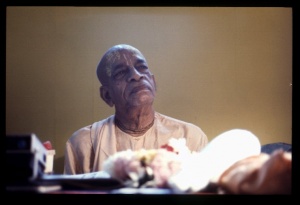CC Adi 14.62: Difference between revisions
m (1 revision(s)) |
(Vanibot #0054 edit - transform synonyms into clickable links, which search similar occurrences) |
||
| (One intermediate revision by one other user not shown) | |||
| Line 1: | Line 1: | ||
{{ | [[Category:Sri Caitanya-caritamrta - Adi-lila Chapter 14|C062]] | ||
<div style="float:left">'''[[Sri Caitanya-caritamrta|Śrī Caitanya-caritāmṛta]] - [[CC Adi|Ādi-līlā]] - [[CC Adi 14|Chapter 14: Lord Caitanya's Childhood Pastimes]]'''</div> | |||
<div style="float:right">[[File:Go-previous.png|link=CC Adi 14.61|Ādi-līlā 14.61]] '''[[CC Adi 14.61|Ādi-līlā 14.61]] - [[CC Adi 14.63|Ādi-līlā 14.63]]''' [[File:Go-next.png|link=CC Adi 14.63|Ādi-līlā 14.63]]</div> | |||
{{CompareVersions|CC|Adi 14.62|CC 1975|CC 1996}} | |||
{{RandomImage}} | |||
==== TEXT 62 ==== | ==== TEXT 62 ==== | ||
<div | <div class="verse"> | ||
eka-dina vallabhācārya-kanyā ‘lakṣmī’ nāma | :eka-dina vallabhācārya-kanyā ‘lakṣmī’ nāma | ||
devatā pūjite āila kari gaṅgā-snāna | :devatā pūjite āila kari gaṅgā-snāna | ||
</div> | </div> | ||
| Line 12: | Line 16: | ||
==== SYNONYMS ==== | ==== SYNONYMS ==== | ||
<div | <div class="synonyms"> | ||
eka- | ''[//vanipedia.org/wiki/Special:VaniSearch?s=eka&tab=syno_o&ds=1 eka]-[//vanipedia.org/wiki/Special:VaniSearch?s=dina&tab=syno_o&ds=1 dina]'' — one day; ''[//vanipedia.org/wiki/Special:VaniSearch?s=vallabhācārya&tab=syno_o&ds=1 vallabhācārya]-[//vanipedia.org/wiki/Special:VaniSearch?s=kanyā&tab=syno_o&ds=1 kanyā]'' — the daughter of Vallabhācārya; ''[//vanipedia.org/wiki/Special:VaniSearch?s=lakṣmī&tab=syno_o&ds=1 lakṣmī]'' — Lakṣmī; ''[//vanipedia.org/wiki/Special:VaniSearch?s=nāma&tab=syno_o&ds=1 nāma]'' — named; ''[//vanipedia.org/wiki/Special:VaniSearch?s=devatā&tab=syno_o&ds=1 devatā]'' — demigods; ''[//vanipedia.org/wiki/Special:VaniSearch?s=pūjite&tab=syno_o&ds=1 pūjite]'' — to worship; ''[//vanipedia.org/wiki/Special:VaniSearch?s=āila&tab=syno_o&ds=1 āila]'' — came; ''[//vanipedia.org/wiki/Special:VaniSearch?s=kari&tab=syno_o&ds=1 kari]'' — taking; ''[//vanipedia.org/wiki/Special:VaniSearch?s=gaṅgā&tab=syno_o&ds=1 gaṅgā]-[//vanipedia.org/wiki/Special:VaniSearch?s=snāna&tab=syno_o&ds=1 snāna]'' — bath in the Ganges. | ||
</div> | </div> | ||
| Line 19: | Line 23: | ||
==== TRANSLATION ==== | ==== TRANSLATION ==== | ||
<div | <div class="translation"> | ||
One day a girl of the name Lakṣmī, the daughter of Vallabhācārya, came to the bank of the Ganges to take a bath in the river and worship the demigods. | One day a girl of the name Lakṣmī, the daughter of Vallabhācārya, came to the bank of the Ganges to take a bath in the river and worship the demigods. | ||
</div> | </div> | ||
| Line 26: | Line 30: | ||
==== PURPORT ==== | ==== PURPORT ==== | ||
<div | <div class="purport"> | ||
According to the Gaura-gaṇoddeśa-dīpikā (45), Lakṣmī was formerly Jānakī, the wife of Lord Rāmacandra, and Rukmiṇī, the wife of Lord Kṛṣṇa in Dvārakā. The same goddess of fortune descended as Lakṣmī to become the wife of Lord Caitanya Mahāprabhu. | According to the ''Gaura-gaṇoddeśa-dīpikā'' (45), Lakṣmī was formerly Jānakī, the wife of Lord Rāmacandra, and Rukmiṇī, the wife of Lord Kṛṣṇa in Dvārakā. The same goddess of fortune descended as Lakṣmī to become the wife of Lord Caitanya Mahāprabhu. | ||
</div> | </div> | ||
__NOTOC__ | |||
<div style="float:right; clear:both;">[[File:Go-previous.png|link=CC Adi 14.61|Ādi-līlā 14.61]] '''[[CC Adi 14.61|Ādi-līlā 14.61]] - [[CC Adi 14.63|Ādi-līlā 14.63]]''' [[File:Go-next.png|link=CC Adi 14.63|Ādi-līlā 14.63]]</div> | |||
__NOTOC__ | |||
__NOEDITSECTION__ | |||
Latest revision as of 18:29, 19 February 2024

His Divine Grace
A.C. Bhaktivedanta Swami Prabhupada
A.C. Bhaktivedanta Swami Prabhupada
TEXT 62
- eka-dina vallabhācārya-kanyā ‘lakṣmī’ nāma
- devatā pūjite āila kari gaṅgā-snāna
SYNONYMS
eka-dina — one day; vallabhācārya-kanyā — the daughter of Vallabhācārya; lakṣmī — Lakṣmī; nāma — named; devatā — demigods; pūjite — to worship; āila — came; kari — taking; gaṅgā-snāna — bath in the Ganges.
TRANSLATION
One day a girl of the name Lakṣmī, the daughter of Vallabhācārya, came to the bank of the Ganges to take a bath in the river and worship the demigods.
PURPORT
According to the Gaura-gaṇoddeśa-dīpikā (45), Lakṣmī was formerly Jānakī, the wife of Lord Rāmacandra, and Rukmiṇī, the wife of Lord Kṛṣṇa in Dvārakā. The same goddess of fortune descended as Lakṣmī to become the wife of Lord Caitanya Mahāprabhu.